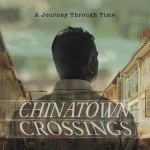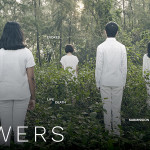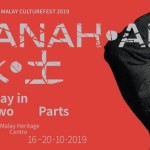“Chinatown Crossings“
Reviewer: Jocelyn Chng
Performance: 13 July 2019
Armed each with a transmitter-earpiece set and a handheld screen fan, we set off from the Chinatown Heritage Centre on Pagoda Street, led by our protagonist Kunalan. He tells us that he grew up in this area, but has not been back in a long time. As we walk, he marvels at the changes – especially the tacky bright lights that are now a staple of Chinatown at night.
I struggle to keep up sometimes, having to jostle past the Saturday night crowds while keeping an eye on the stage manager – we have been advised to keep close to her in order to better receive the audio. Indeed this is one of the few slight annoyances of the evening, as my experience is marred by substantial audio interference.
I get used to it though, and devote my energy to soaking in the environment (we have also been told to immerse ourselves in the experience, but I am sceptical about this – more on this later).
What I value most about Chinatown Crossings is its treatment of the history of a place that is more culturally heterogeneous than the name “Chinatown” implies. I greatly appreciate the choice to show us the area through the eyes of an Indian protagonist raised by his neighbour’s Cantonese ma jie (domestic helper).
Despite being Singaporean, I am ashamed of my ignorance that the area was only christened “Chinatown” by the government authorities as recently as the 1980s, although I was aware of its other names, Kreta Ayer and Niu Che Shui/Goo Chia Zhui (牛车水). Also, much of the rich history of the neighbourhood is closely tied to the Cantonese community. Not being Cantonese, the experience puts me in an intriguing yet disorienting position – I actually feel like an outsider. I learn a lot, but it feels like being on one of those city walking tours as a tourist.
The touristy aspect is further highlighted at two points. The first is when we are given the opportunity to “make our own” chendol, complete with enthusiastic step-by-step instructions from Ting Ting, Kunalan’s feisty neighbour and childhood best friend. The second instance is when we get to decorate our plain fans with ink-stamped designs. While these segments feel slightly kitschy to me, I applaud the thought given to incorporating interactive segments that meaningfully share the area’s culture and history without being tokenistic.
Credit also goes to the skilful cast, who not only play characters but also act as “tour guides,” looking out for the audience’s safety as we cross roads, and facilitate the above-mentioned interactive segments. Jodi Chan as Fong Cheh, Ting Ting’s ma jie, has the especially challenging task of ageing five decades in the span of two hours, which she carries off admirably.
In an overall carefully thought-through piece, a minor quibble that I have is with the non-linear timeline. Whilst it is easier to designate time periods in a conventional stage setting, it is much harder to convincingly maintain a sense of the past in such an experience. Although this has been managed by having Kunalan (in contemporary time) take us through most of the touristy streets lined with souvenir shops, there are times when this is also done by Kunalan and Ting Ting (as kids in the 1960s), and Ting Ting (in 1986). It is during the latter instances that I find it difficult to be immersed in a strict sense, as I am concurrently bombarded with sights of toy Transformers and tourists snapping pictures on their mobile phones.
The ending is wistful, with the passing of Fong Cheh and the impending demolition of Pearl Bank Apartments – the comment on conservation issues in Singapore is not lost on me. Nevertheless, I come away from Chinatown Crossings feeling recharged. As Kunalan likes to say, Chinatown is full of “ghosts” from the past, and I am glad to have encountered some of them.
Do you have an opinion or comment about this post? Email us at info@centre42.sg.
ABOUT THE PRODUCTION
CHINATOWN CROSSINGS by Drama Box
6 June – 13 July 2019
Chinatown
ABOUT THE REVIEWER
Jocelyn holds a double Masters in Theatre Studies/Research. She is a founding member of the Song and Dance (SoDa) Players – a registered musical theatre society in Singapore. She is currently building her portfolio career as an educator and practitioner in dance and theatre, while pursuing an MA in Education (Dance Teaching).




